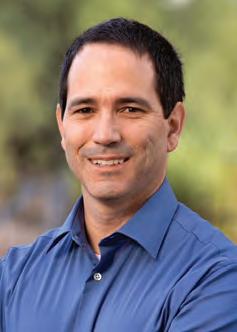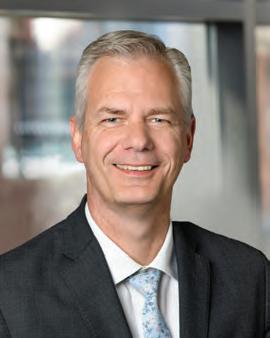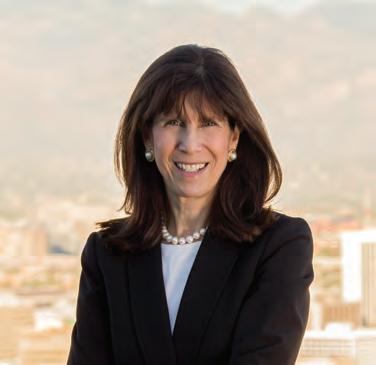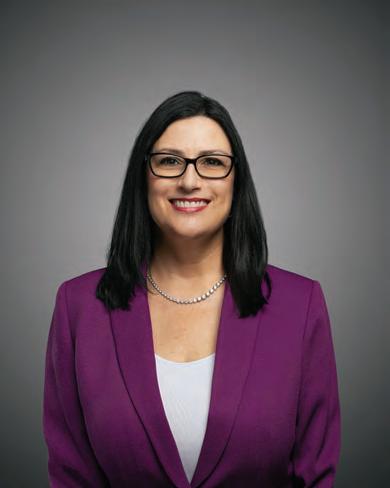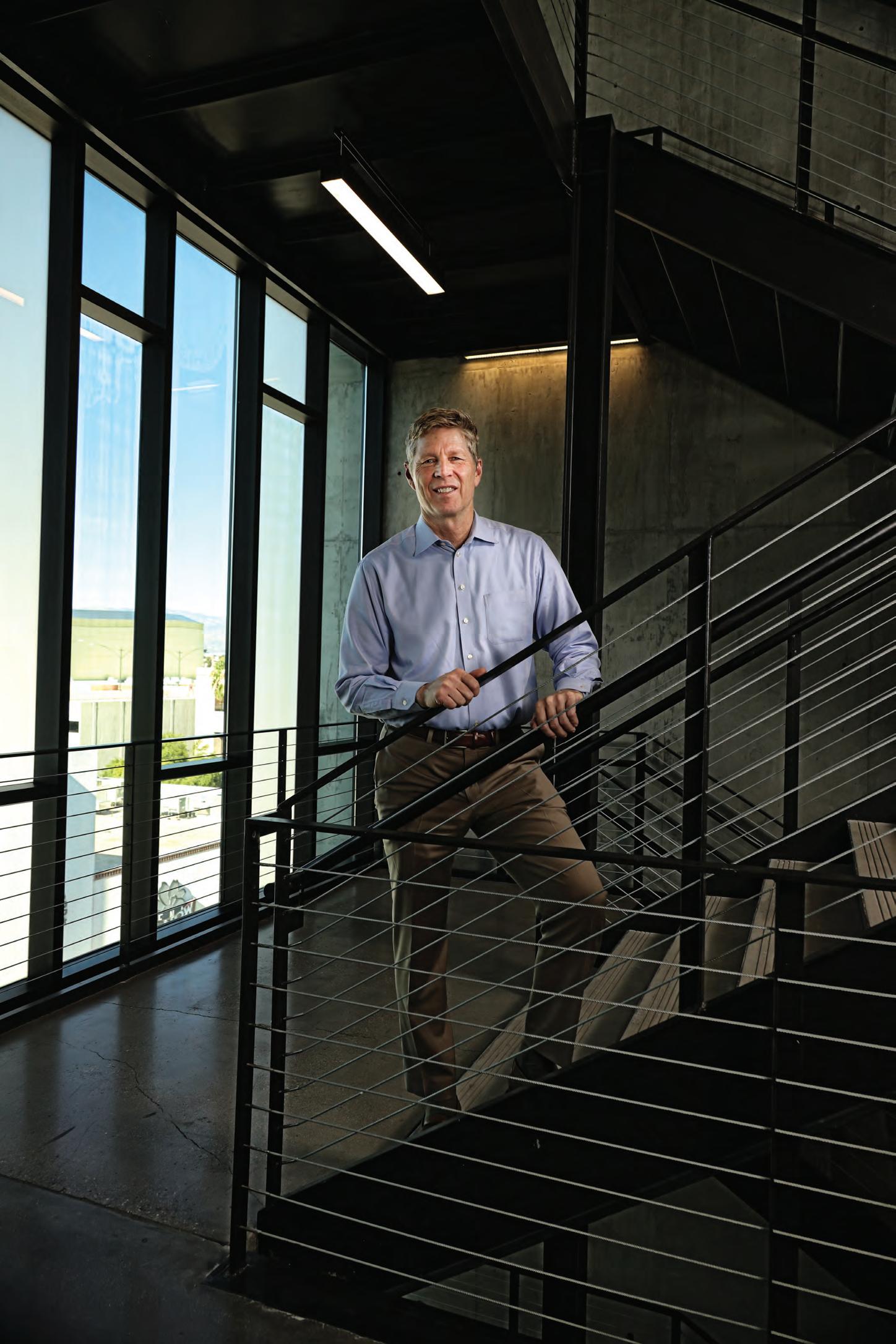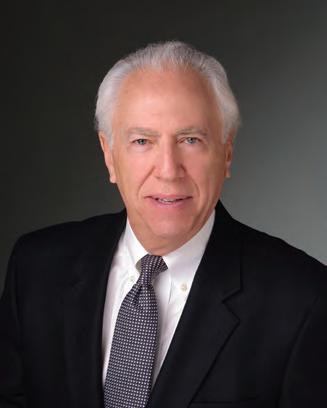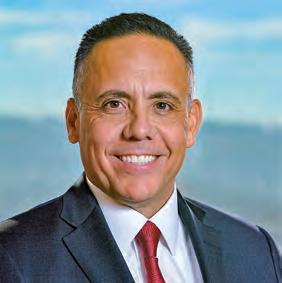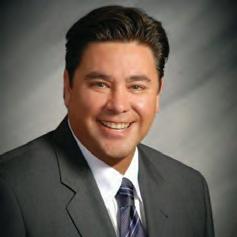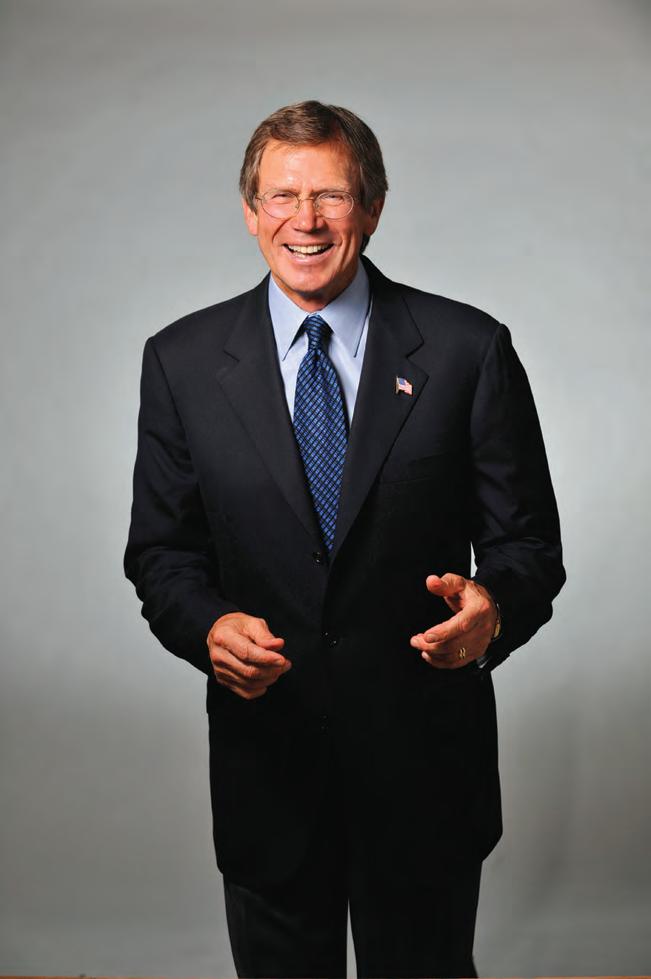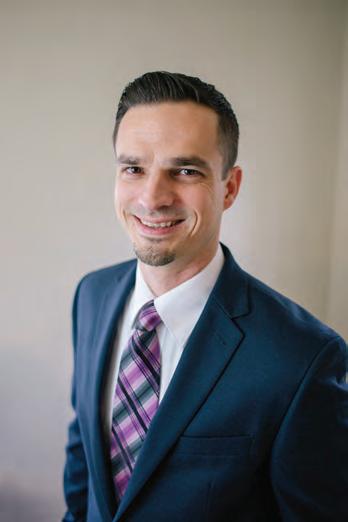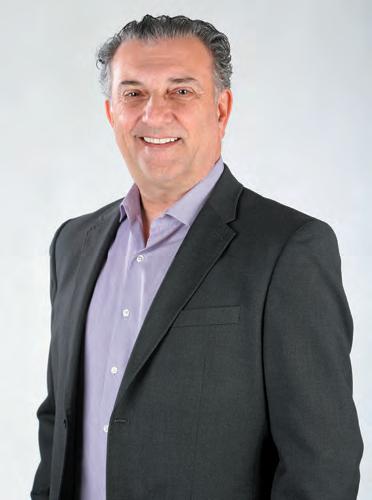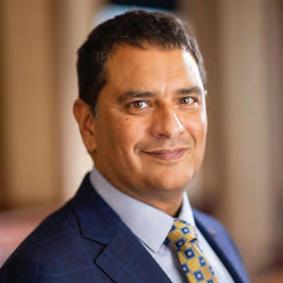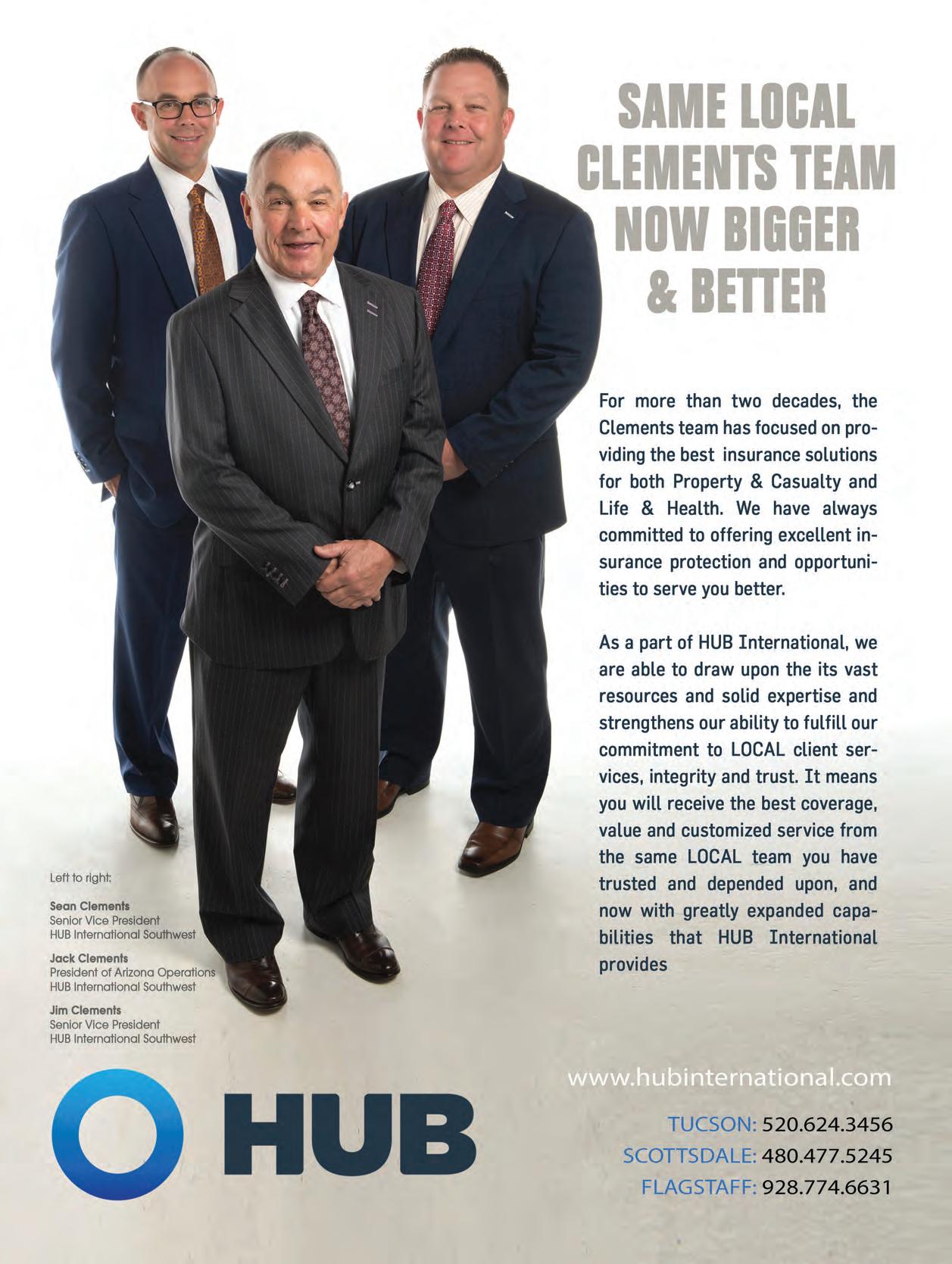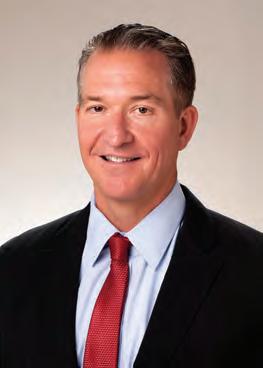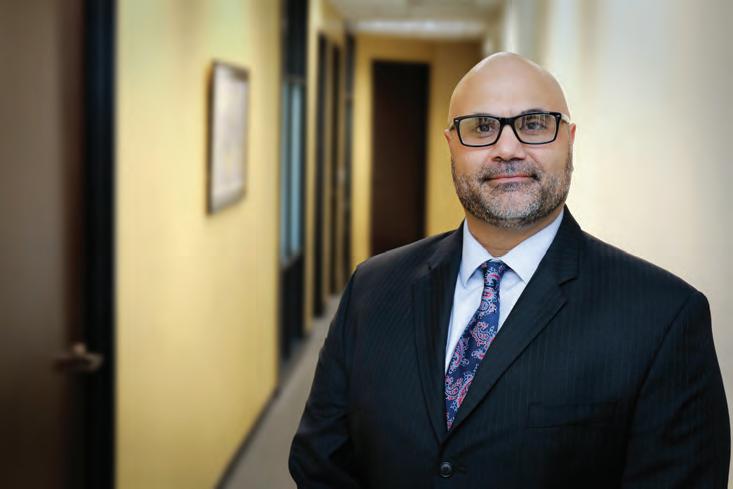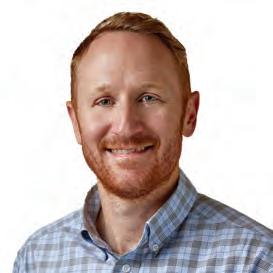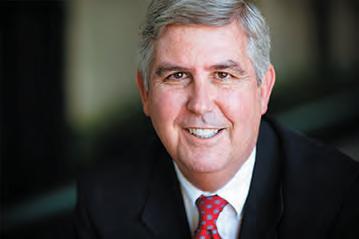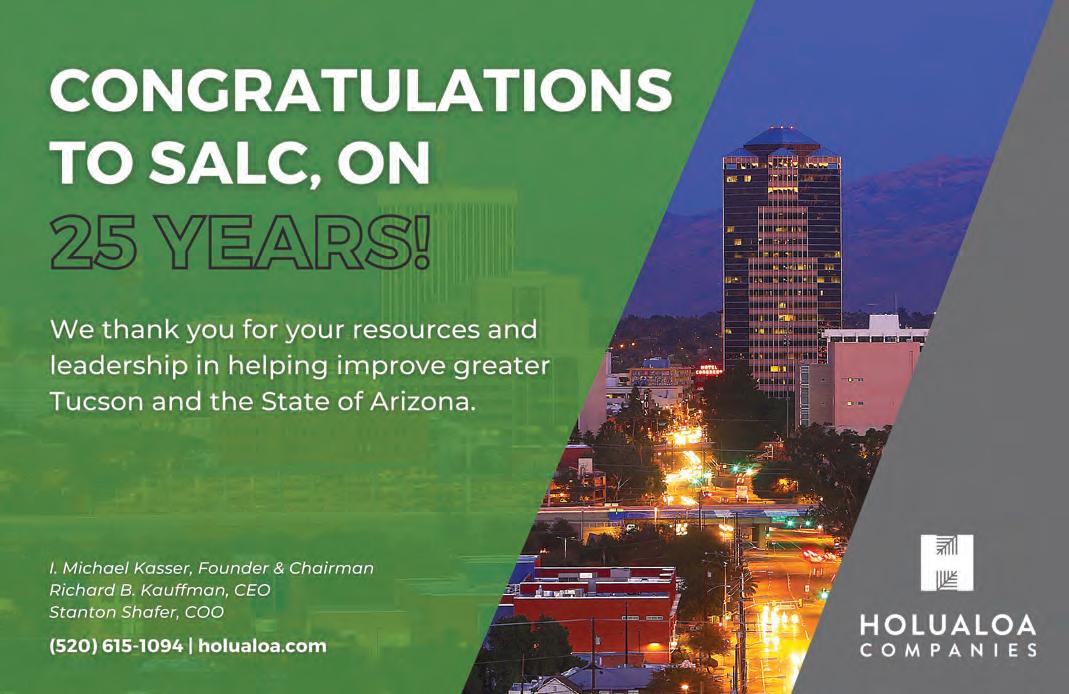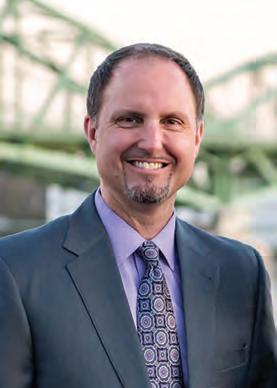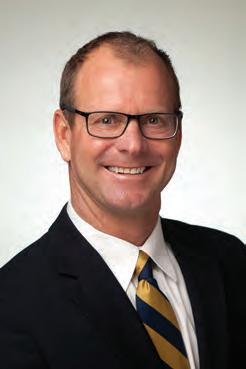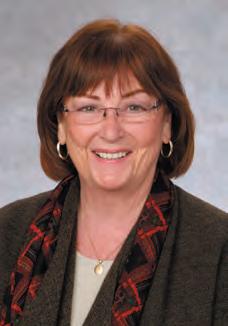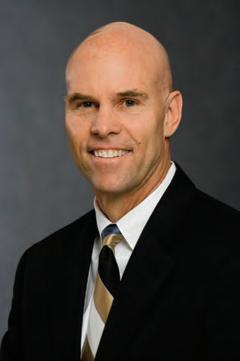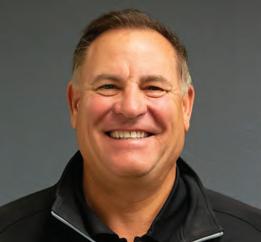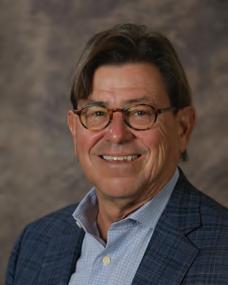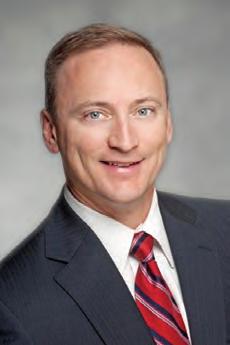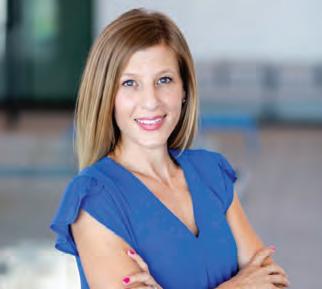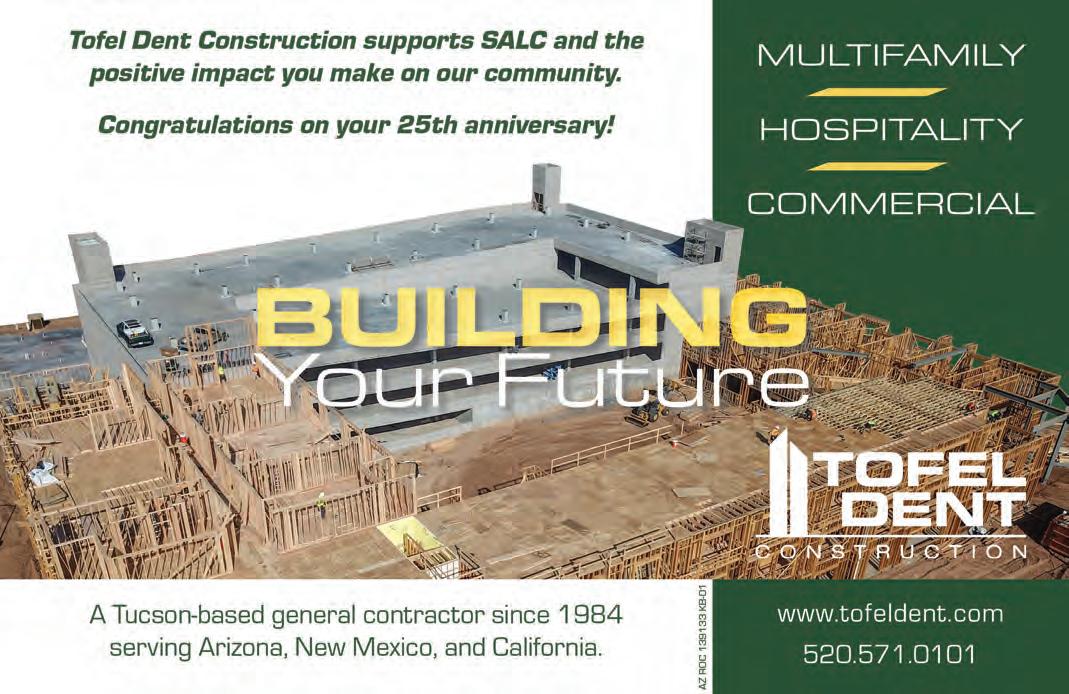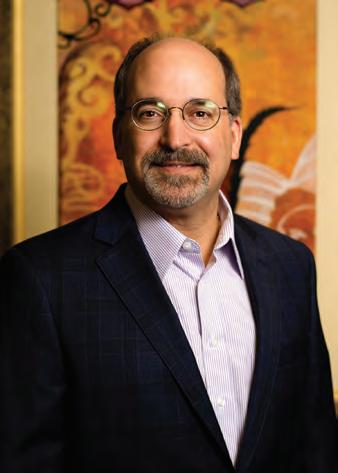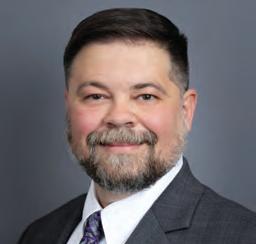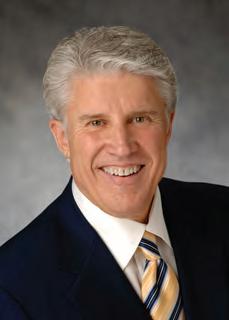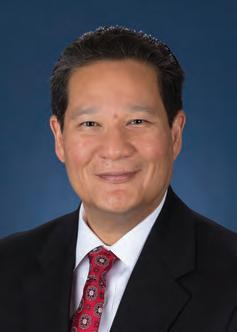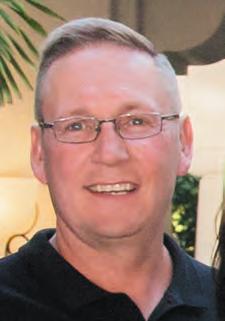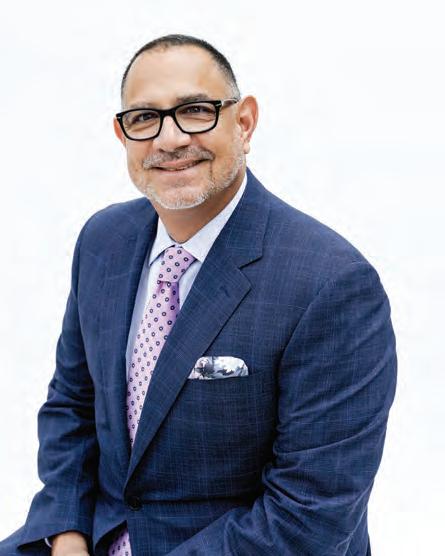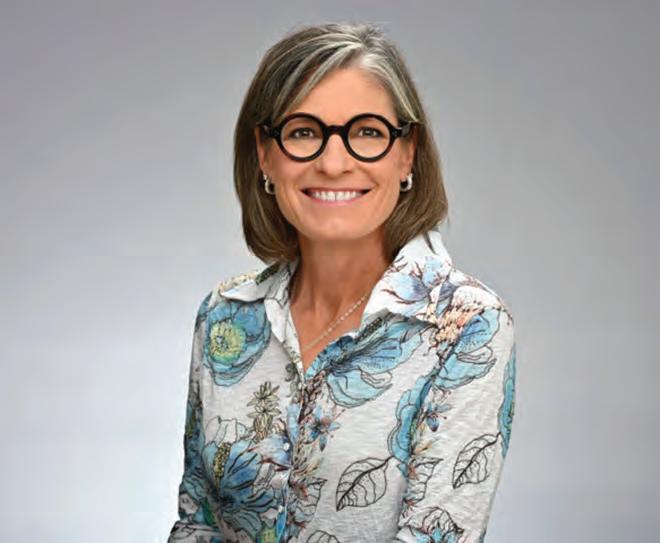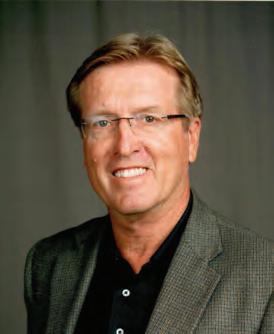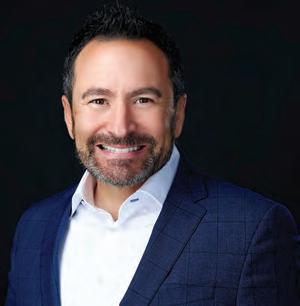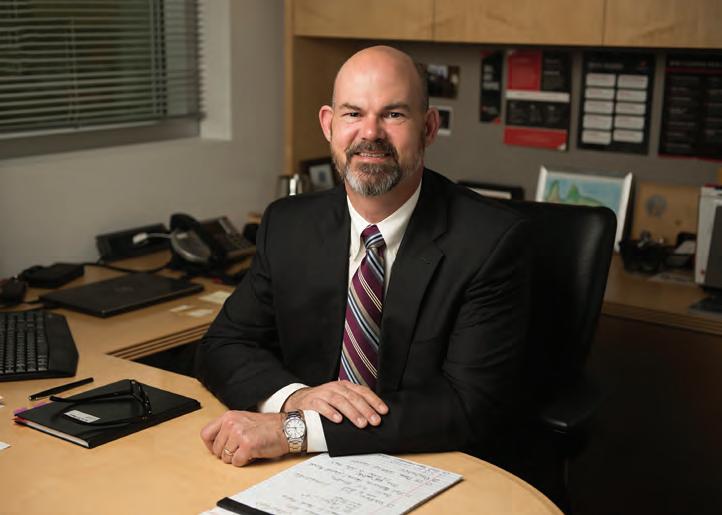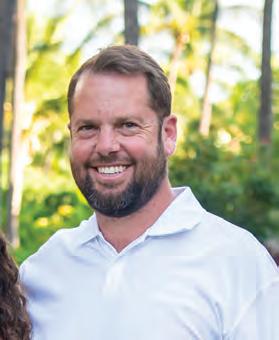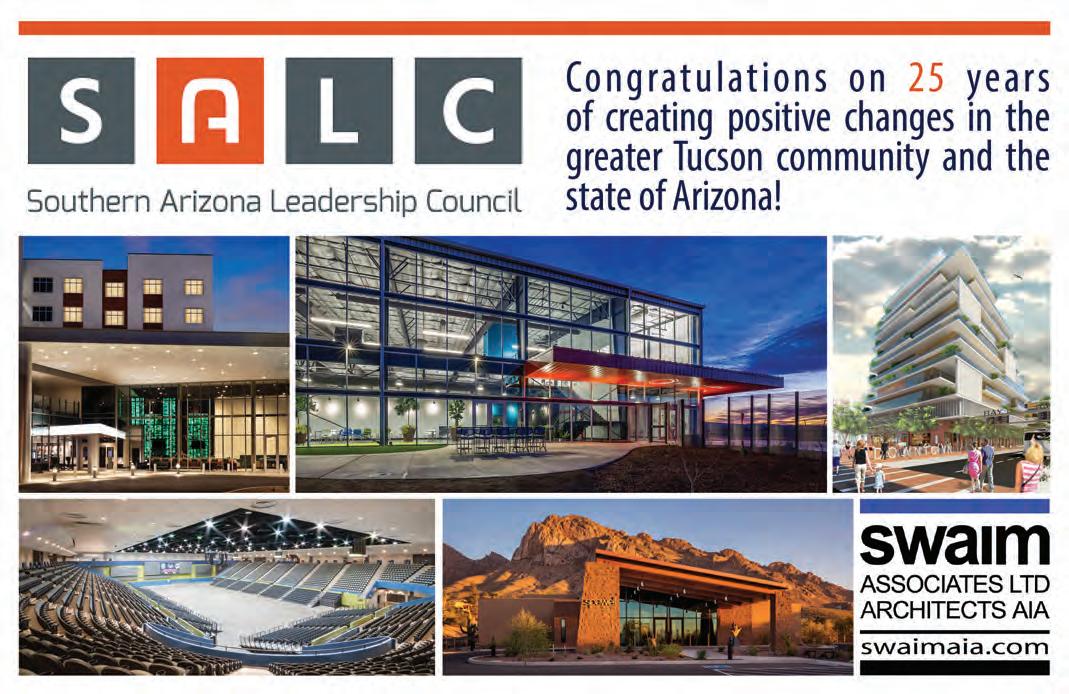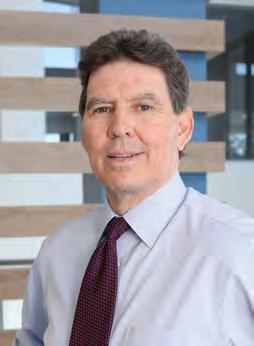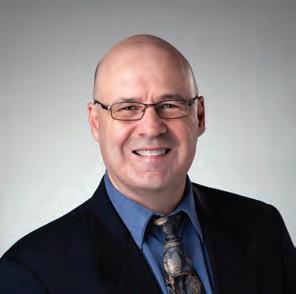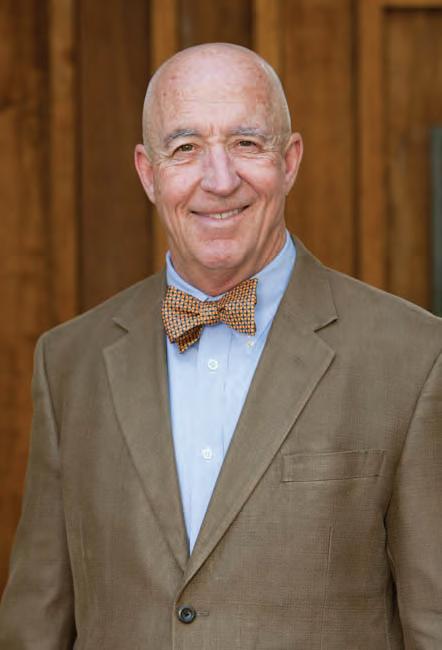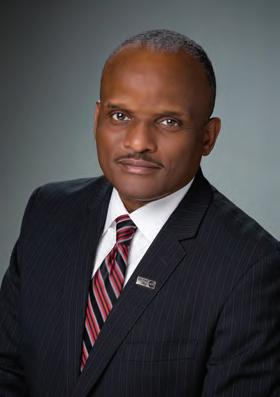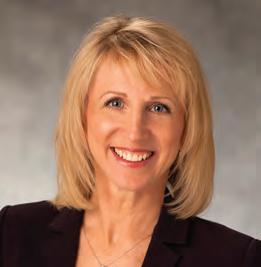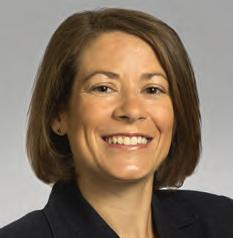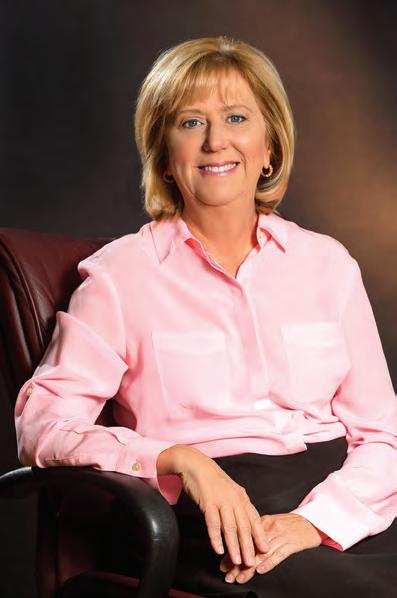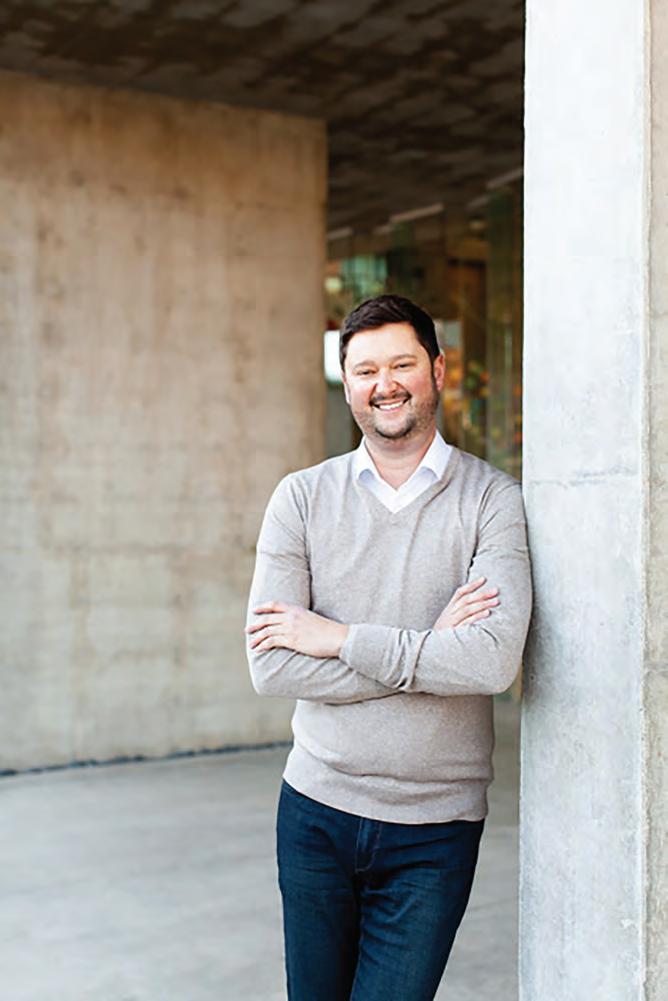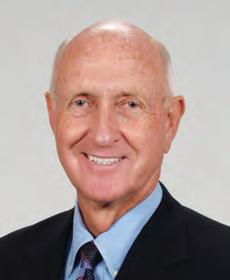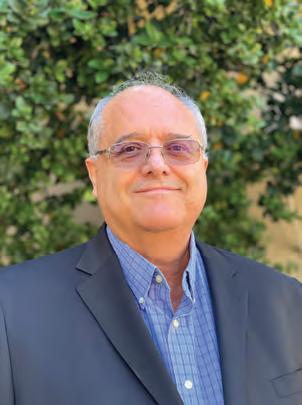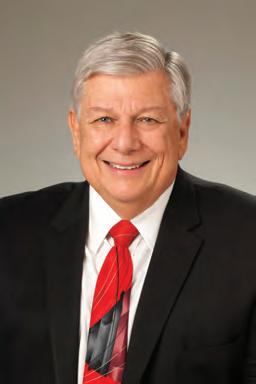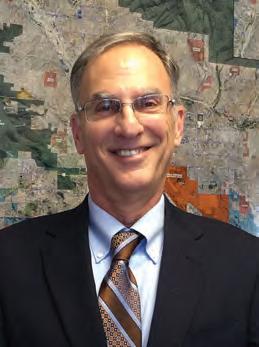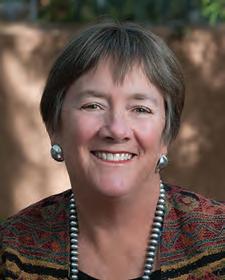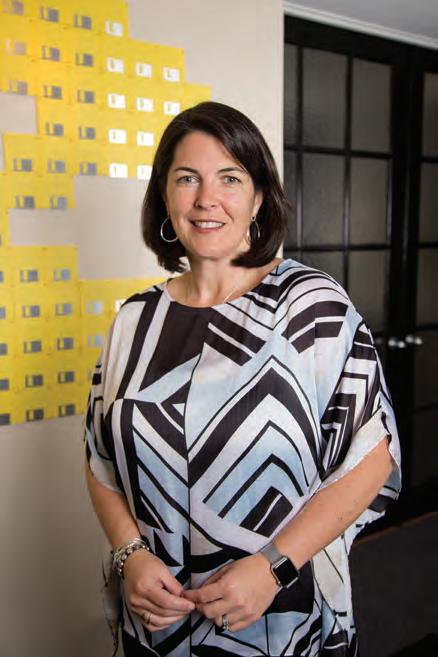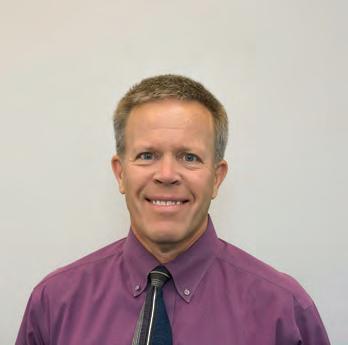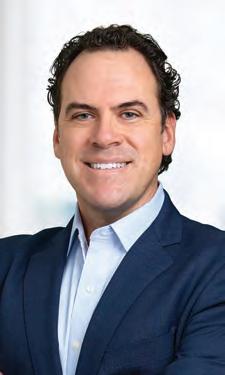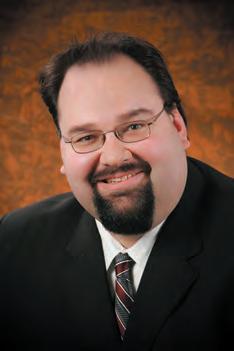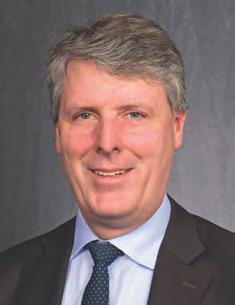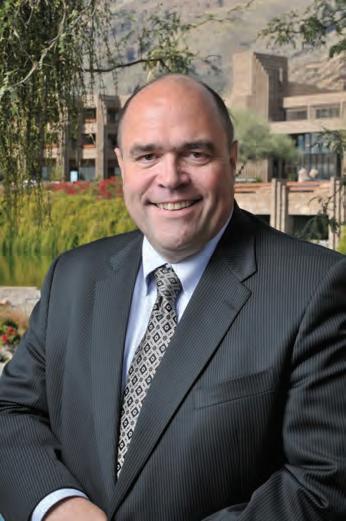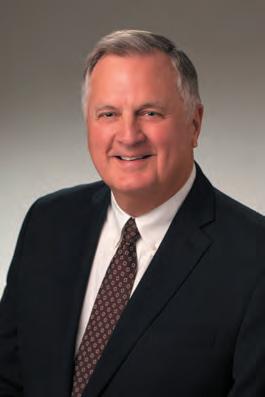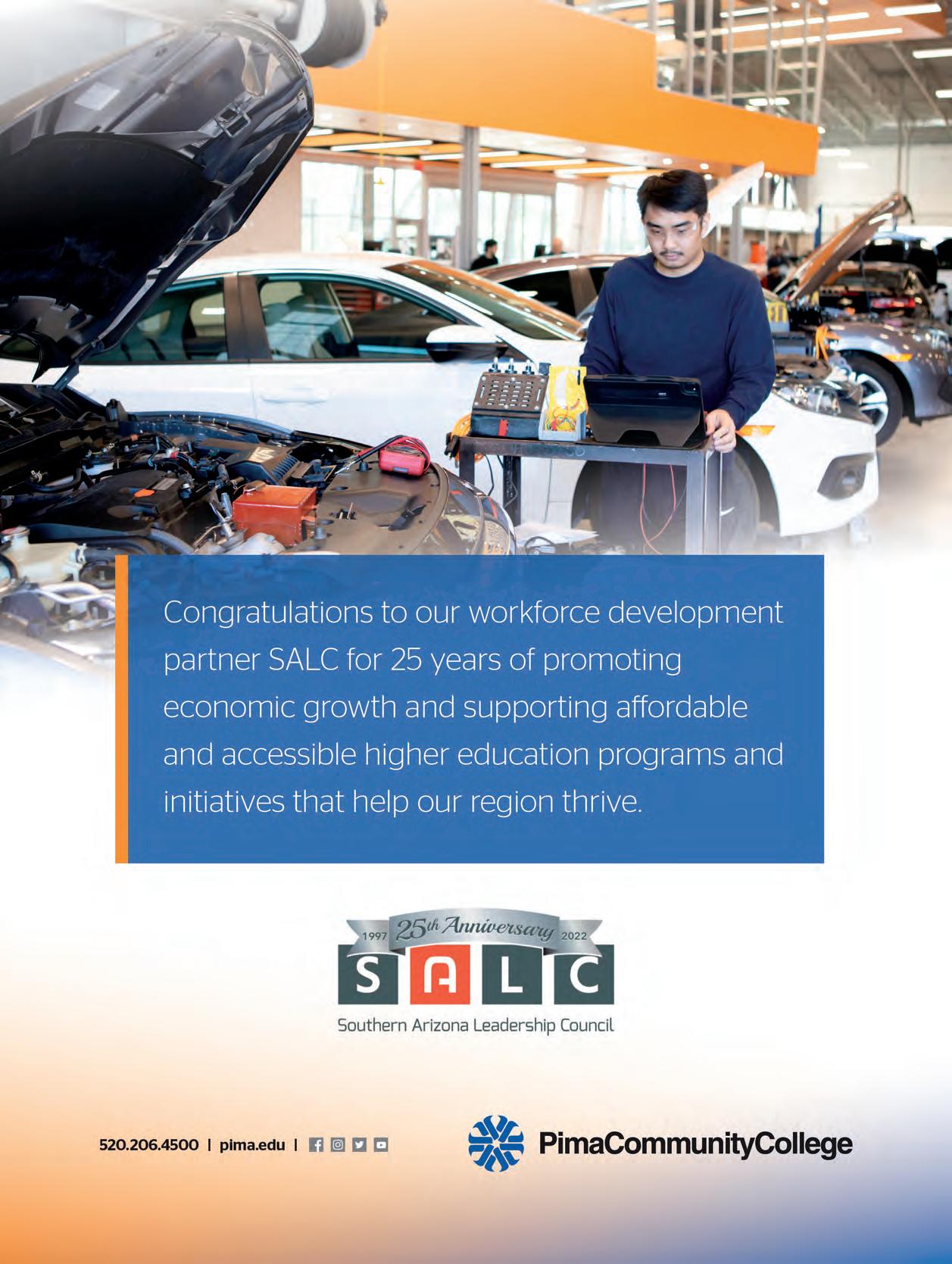Expanding Influence, Economic Vibrance


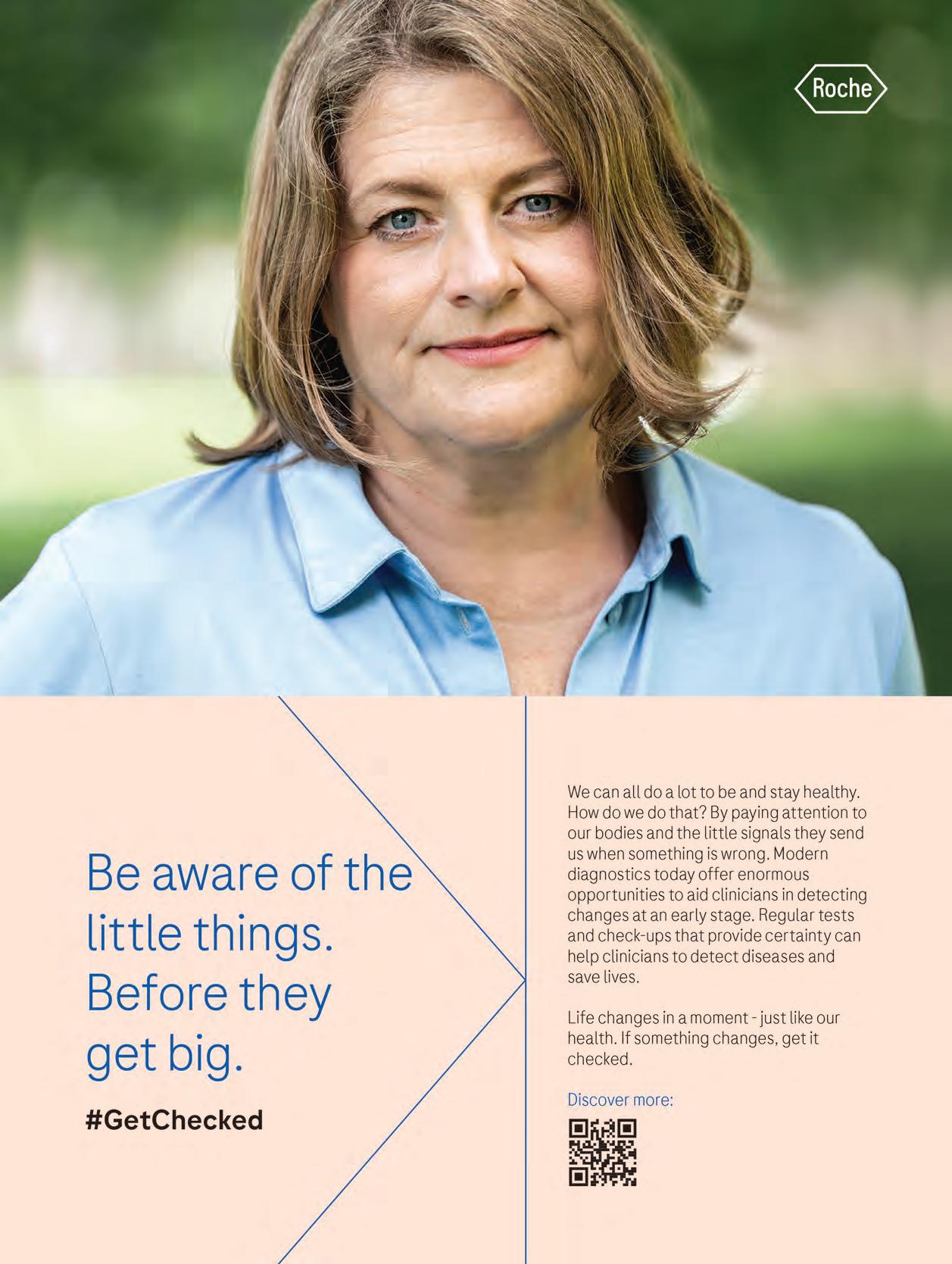
















Improving our future.
It’s a simple yet incredibly complex concept that Southern Arizona Leadership Council members step up to champion.
For the past 25 years, SALC has established itself as the region’s most influential nonpartisan and policy-focused organization. Composed of Csuite executives from a wide array of sectors, SALC’s mission is to bring together resources and skilled leadership to enhance the economy and quality of life in Southern Arizona.

Today SALC has more than 140 members who devote their time and talents to pressing issues facing the region, including transportation and infrastructure, governance, preschool to postsecondary education, healthcare and innovation, among others.
SALC President & CEO Edward P. “Ted” Maxwell said the group formed organically in 1997 in response to a vocal anti-growth sentiment in the region. “The founding members were concerned that the greater Tucson area was not being receptive to economic
growth.” he said. “There had been other organizations formed that weren’t effective, so a new approach was important.”
SALC immediately focused on coalition-building and bringing together people with diverse viewpoints. The group was cognizant that they couldn’t just be concerned with immediate business issues, and needed to look at all the issues effecting quality of life like education and healthcare.
SALC has had tremendous success on a variety of fronts over the years.

The Regional Transportation Authority, the first-ever independent taxing district focused on multi-modal transportation projects, was passed in 2006 thanks in large part to SALC’s tireless efforts to form the policy, then garnering voter support. The first RTA plan went into effect in 2006 and, since that time, 928 major improvement projects have been completed along with 300 miles of new bike lanes, including portions of the Chuck Huckleberry Loop. The second 20-year phase of the RTA will begin in 2026, pending voter approval.
SALC was also instrumental in establishing the Pima County Joint Technical Education District, which provides free career and technical education to high school students and is an essential component of developing the region’s workforce. Education remains one of SALC’s five primary focus areas, along with infrastructure, healthcare, innovation economy, and governance.
Rob Draper, president of O’Rielly Chevrolet and SALC’s current chair, said SALC brings people together, even during polarizing times, by focusing on
shared priorities and putting the needs of many over the wants of a few.
“I think SALC has remained important to Tucson and Southern Arizona because its mission is aligned with the ambitions of - and can be embraced bypretty much every community-minded, growth-oriented individual and entity in the region,” he said. “Differences of opinion will almost certainly [happen], but…it would be difficult to find many who would oppose the mission itself.”
BizLEADERSHIP
continued from page 71
Susan Gray, president and CEO of TEP/UNS Energy and current vice-chair of SALC’s board, said that SALC influencers and advocates bring much-needed clarity and visibility to critical issues. “Crystallizing priorities, sharing perspectives and brainstorming is important, but these aren’t just theoretical conversations,” she said. “Our members are drawing from their own professional experiences in our community to identify shared areas of concern that can be effectively addressed through coordinated action.”


David Cohen, president of BeachFleischman and SALC’s Chair Pro Tem, took this thought a step further. “Anything that affects the community at large also affects business owners,” he said. “When making decisions, SALC digs deep
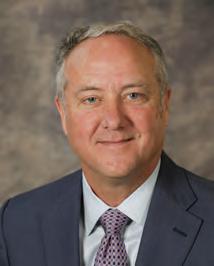
“I think SALC has remained important to Tucson and Southern Arizona because its mission is aligned with the ambitions of – and can be embraced by –pretty much every community-minded, growth-oriented individual and entity in the region.”
into the issue to make informed decisions.”
Many issues lie on the horizon for the region. SALC’s Focus Areas, driven by dedicated teams of experienced professionals and SALC board members, focus on positive and workable solutions in education, infrastructure, healthcare, innovation and governance.
THE TOP AREAS IDENTIFIED FOR 2023: u Workforce development u Working to ensure RTA renewal (“RTA Next”) u Leading to secure Southern Arizona’s water future

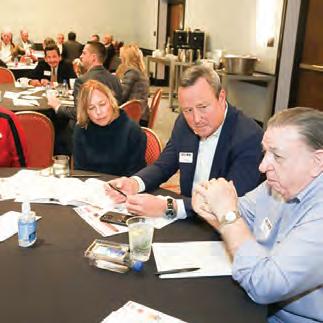
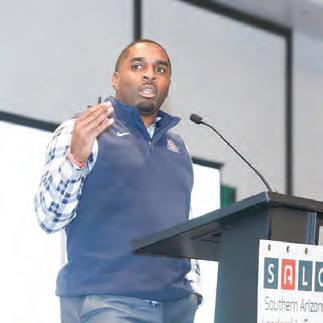
u
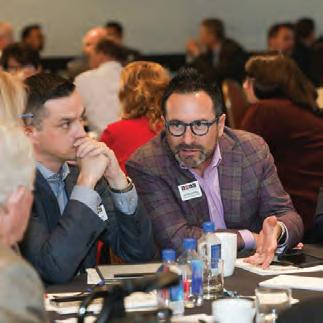
– Rob Draper President of O’Rielly Chevrolet and Chair, Southern Arizona Leadership Council
many partners in the state in this work.”
Promoting effective governance at the local and state levels is also an ongoing priority. Sarah Smallhouse, who co-chairs the Governance Focus Area alongside Ted Hinderaker and Si Schorr, said, “We believe our governance could be meaningfully improved though election reform. We are actively exploring alternative election processes that could improve our statewide and local election structures, as well as supporting efforts to educate voters on problems created by primaries. Our current system allows a small minority of voters to determine our general election choices. The goal is cross-partisan problem-solving and a collegial spirit of working together for the benefit of all.”
With drought severely impacting much of the western United States, wa-
ter policy also remains critically important. “There is much focus on the state of the Colorado River and therefore the Central Arizona Project,” Maxwell said. “But there are several other key issues as well, such as groundwater management.”
To that end, SALC has numerous members engaged on the topic both locally and statewide. Kip Volpe chairs the Tucson Regional Water Coalition and was a member of the Governor’s Drought Contingency Plan steering committee. Maxwell continues to serve on the Water Augmentation, Innovation and Conservation Council and currently serves on Senator Kyrsten Sinema’s Water Advisory Council.
Partnership and coalitions like these have always been and will continue to be a vital part of SALC’s advocacy

work. “SALC is a trusted partner in our region,” said Nicole Barraza, SALC’s director of governance and outreach. “Elected officials and community stakeholders consistently reach out when issues of regional or statewide significance arise.”
The Arizona Commerce Authority is the state’s leading economic development organization with a streamlined mission to grow and strengthen Arizona’s economy. Sandra Watson, ACA’s president and CEO, has worked frequently with the SALC team and believes SALC’s commitment to collaboration has advanced the quality of life throughout the state.
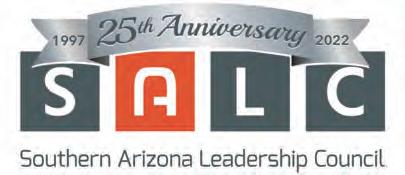
“We are grateful for SALC’s commitment and partnership to foster Southern Arizona’s economy and enhance opportunities for Arizonans,” she said.
Biz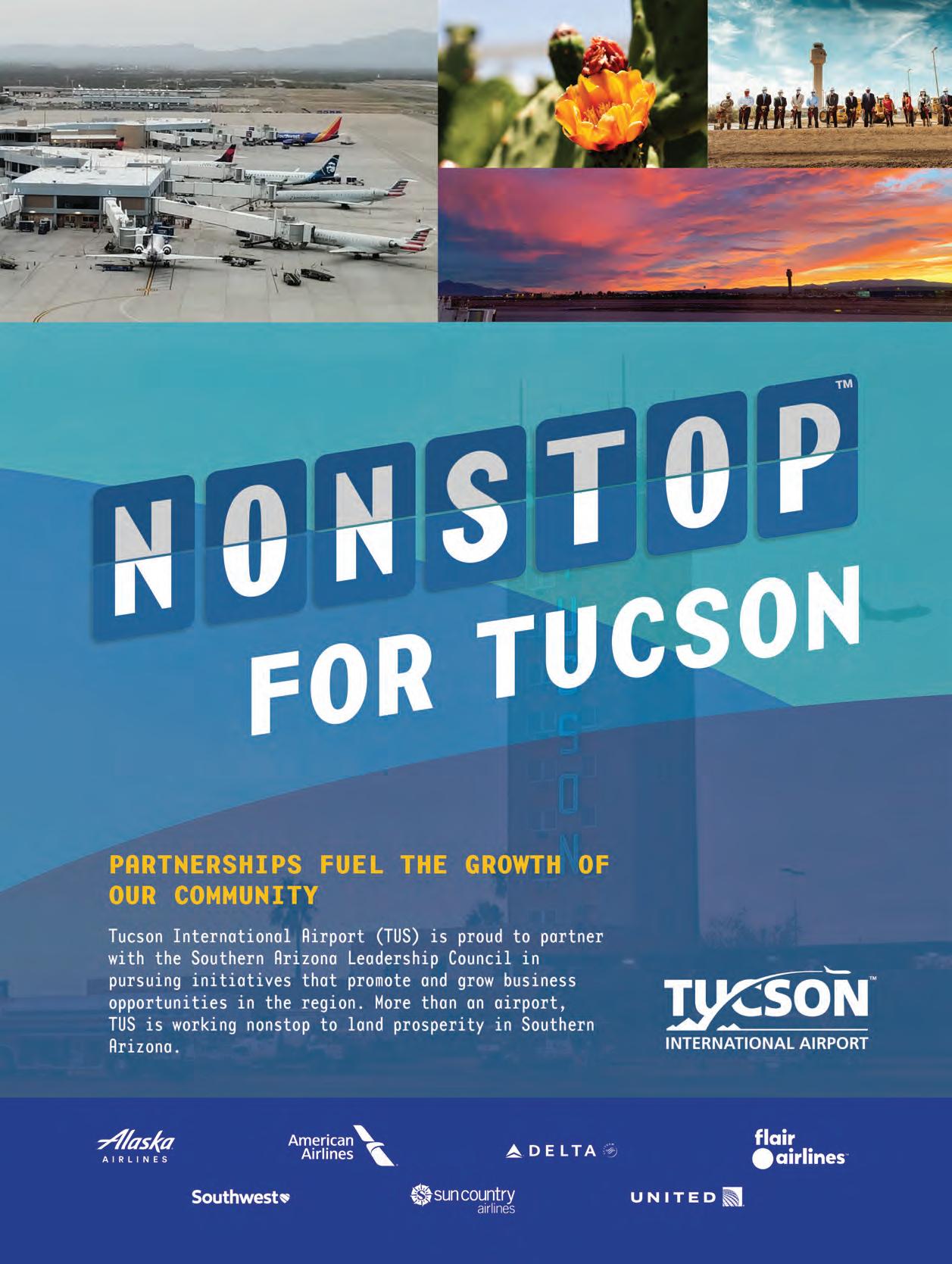







For more than two decades, the Southern Arizona Leadership Council has worked to increase economic vibrancy and quality of life in the region.
Worked with the governor and other business organizations to secure passage of major economic reform legislation:
– Reduced business property tax rate from 25% to 20% over 10 years.
– Created tax credits for investors who commit funds for high-tech start-up companies.
– Applied 80% sales factor benefit to businesses making $1 billion new investment in Arizona.
<<< continued on page 78
In partnership with HCSA, led conversation to create Southern Arizona Information Exchange, which ultimately merged with a state -level initiative.
Engaged with Governor Jan Brewer to develop a plan to borrow $1 billion, cut $1 billion and raise $1 billion via a temporary tax.
Expect More Arizona Founded Helped to create a statewide education initiative, Expect More Arizona, a publicprivate partnership as a shared voice of business and education leaders for P-20 continuum.
SALC created TVT and spun it off into its own 501(c)(3) organization as the foremost voice on recruitment and retention of high quality teachers in the region.







Helped ameliorate nursing shortage by founding Hospital Council of Southern Arizona and developing a plan to produce 150 new registered nurses for the community.
Successfully led engagement with legislature to give Pima County voters the authority to increase sales tax to fund future infrastructure.
Created Arizona Bioscience Board to address lack of available risk capital, recruited CEOs statewide and produced comprehensive report spurring the establishment of new




Led campaign to change City of Tucson charter by passing Propositions 403 and 404, giving city manager exclusive ability to hire/fire direct reports and the mayor a voting position on city council.
Established new Leadership Fund to provide nimble response to, and funding of, ey legislative campaign efforts.
2015Strategically advocated to pass bonding package for R&D and infrastructure for Arizona’s universities.
Prominent advocacy resulted in legislature reauthorizing and funding Angel ax Credit for investing in small, rural or bioscience companies.
Convened campaign to defeat a “sanctuary city” proposition that would have caused Tucson to forfeit more than $138 million in state-shared revenue and federal grants, and would have prevented federal partners like FBI and DEA from assisting local police in solving crimes.
SALC was first business organization to publicly back 20-year extension of Proposition 301, providing $444 million in new revenues annually for schools.







Successfully advocated for 10-year extension to Rio Nuevo Multipurpose Facilities District, the driving force for revitalization in Downtown Tucson.
Advocated to secure new funding for Graduate Medical Education, helping ensure an adequate pipeline of medical professionals for our growing region and state and serving as an economic driver.
In collaboration with Tucson Young Professionals, initiated a guided mentorship to fur ther personal and professional development and groom the next generation of community leaders.

Crafted legislation and successfully appropriated $54 million for environmental studies to include the Sonoran Corridor; Successfully advocated for appropriation of $400 million to widen Interstate 10, potentially leveraging a federal match.
Featured remarks from major employers of various sectors and explored solutions to critical challenges around workforce attraction and retention.


The Southern Arizona Leadership Council grew out of a desire to bring together resources and CEO-level leadership to find solutions to critical strategic issues facing the region.
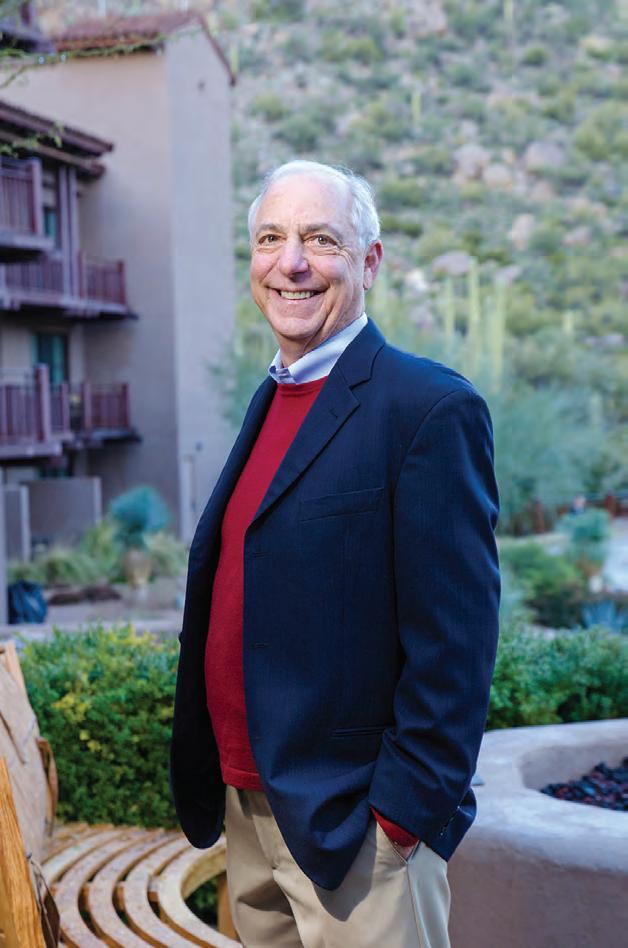
Dissatisfied with the lack of a strong voice of business, Hank Amos, owner of Tucson Realty and Trust, Tucson’s oldest real estate company, began a discussion with six visionary business leaders. The seven are now credited as founders of SALC. Those founding members represented a broad segment of Tucson’s economy – Amos; Si Schorr, a partner in one of Tucson’s most prominent law firms; Larry Aldrich, then-president and CEO of Tucson Newspapers; Charles Bayless, president and CEO of Tucson Electric Power; David Wright, president of Arizona Bank; David Mehl, owner of Cottonwood Properties; and Greg Shelton, a VP at Raytheon Missile Systems.
Conversations led to a series of meetings ultimately attracting 30 interested business leaders to the discussions. They shared a common theme – to form a group capable of using the influence, resources and leadership of local CEOs to create a vibrant economic environment and high quality of life in Southern Arizona.
The group identified an emerging category of new organizations known simply as CEO leadership groups. The founders of SALC adopted the basic structure used by these new groups adding a unique Southern Arizona spin. The formula: limit membership to the senior leader of an organization, engage issues of strategic importance, remain fiercely non-partisan and conduct business in an ethical way with integrity and honesty in every aspect of its operation.
Bayless was elected as the first chair of SALC and led the development of the vision and mission for the organization.
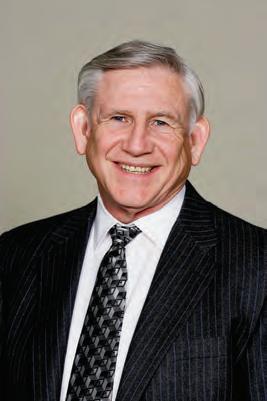
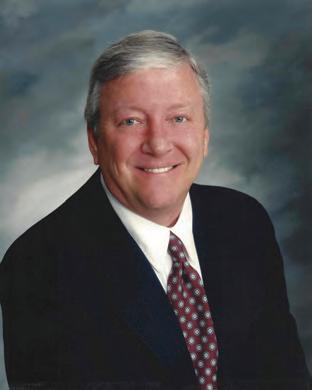
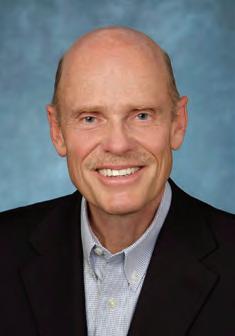

Similarly, business leaders in Phoenix had started their own CEO leadership group several years earlier, and those leaders saw value in a potential partner ship with the new Tucson-based group. They offered assistance as SALC began operations. Greater Phoenix Leadership immediately became a close ally and to day SALC works closely with GPL and the newest CEO group in the state, Flagstaff’s Northern Arizona Leadership Alliance, for the good of all the communities and for Arizona.

Reflecting back, Bayless said, “I had no idea that SALC would grow and prosper as it has, but I knew the time was right for a new leadership group and I had to be part of it.”
SALC’s second chair, Aldrich, added, “We had some very difficult conversa tions in those early days and I wondered if we could keep the group together. In the end the members recognized what was at stake and today this community is far bet ter off because we did.”
“ The diversity of thought among the seven founding members of SALC was an important factor in making the organiza tion successful,” said SALC president and CEO Ted Maxwell. “It’s amazing to me that several of the original founders con tinue as active members of SALC today. The continuity they provide has served us well over SALC’s existence.”
“SALC has done many wonderful things and made a lot of progress,” Amos said, “but there is still much to be done in many areas. Two of the most critical are building needed infrastructure and im proving our business climate in order to at tract more jobs.”
SALC Vice President and COO Shelley Watson stated, “The caliber of SALC’s members has remained extremely high throughout the years, which has leveraged impact and progress.”
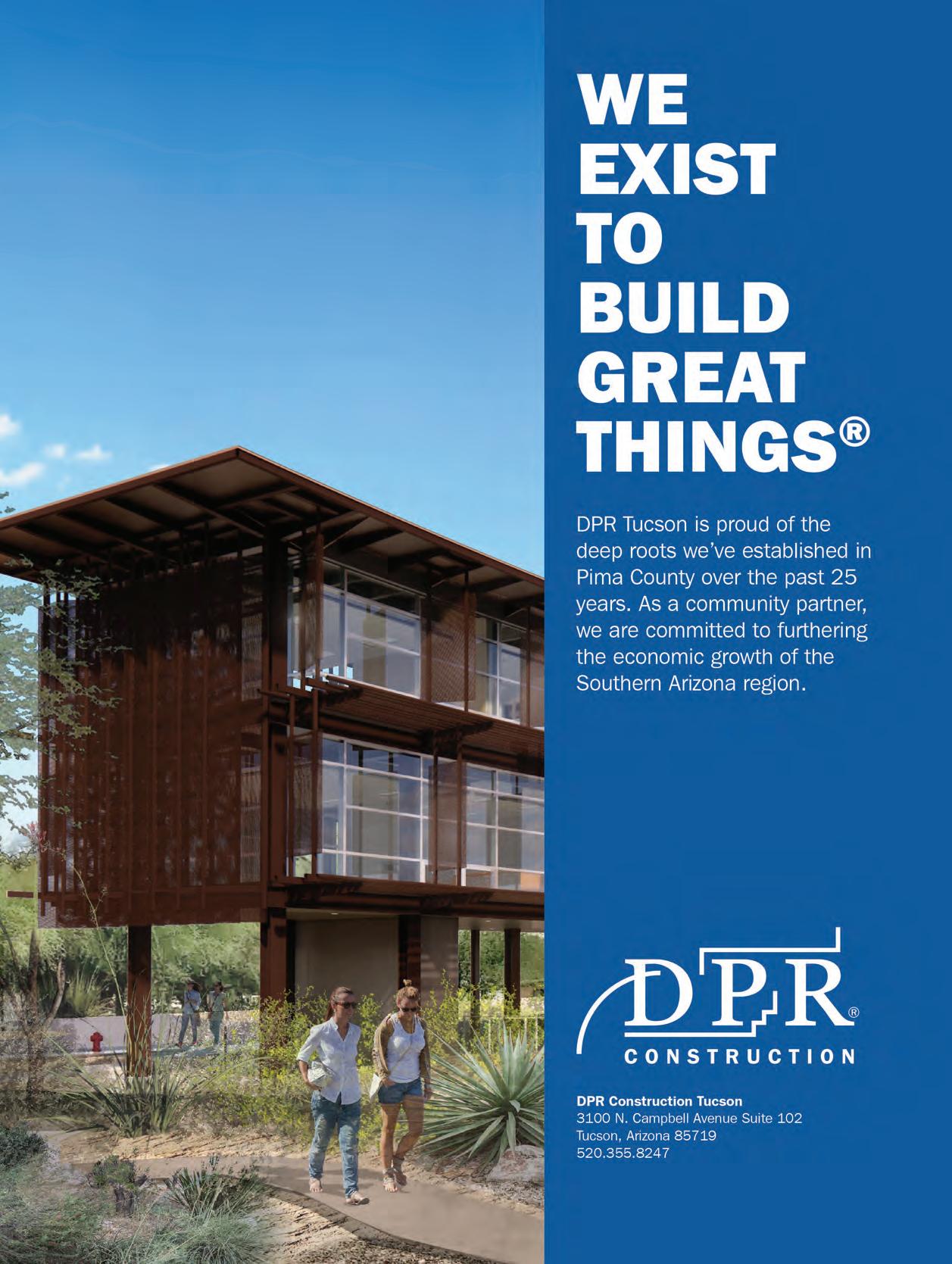




Southern Arizona Leadership Council’s member-wide meetings could be called the region’s version of a Davos or a G20 of the Southwest – essentially a leadership summit of the best business minds.

With membership of over 140 people representing an incredibly diverse array of businesses and major community organizations, SALC’s board leads a dynamic group of accomplished business leaders with
deep connections throughout Southern Arizona.
SALC Board Chair Rob Draper is president of O’Rielly Chevrolet. Vice-Chair Susan Gray is president and CEO of TEP/UNS Energy. Chair Pro Tem David Cohen is president of BeachFleischman PLLC. Board Treasurer Cristie Street is CEO of Nextrio and Board Secretary Don Bourn is CEO of Bourn Companies.
But how does this dream team of leaders manage to lead leaders?
Draper believes this is possible because of the perennial relevance of SALC’s mission and its consistent nonpartisan focus on collaboration. “Members are expected to contribute their time and talents, but on the flipside they reap the benefits of being part of a top-level clearinghouse of information and ideas, a place where they can hear the latest thinking of others on key issues and expand and sharpen their own knowledge and understanding of those subjects,” he said.
This give and take keeps members involved and interested. “That and the sense of obligation and pride I think we all share in trying to make Tucson and Southern Arizona a better place to live for everyone,” Draper said. Gray took this thought a step further. “Our members dedicate their talent and time as conveners, influencers and advocates, connecting the dots and bringing visibility to issues that are critical to our path ahead,” she said, adding that the diversity of thought and representation ensure that SALC and its message reach all corners of the region and state.
That SALC has managed to thrive during incredibly divisive and polarizing times is a testament to the organization’s commitment to nonpartisan consensus building and inclusiveness.
“In order to be placed on our agenda, an issue must be strategic and important to the welfare of the community and must have a reasonable chance of achieving an improvement in our region,” Draper said. He added that neither of those criteria can be met when issues only benefit a select group of people. “We focus our efforts on initiatives that can have the broadest impact on our community.”
This foundational approach sets SALC up for long-term success. “SALC is built for the future,” said Cohen. “We have invested in strong and inspired management, people that work hard and truly care about SALC’s mission and vision.”
The management team Cohen refers to includes: President and CEO
Ted Maxwell; Shelley Watson, VP and COO; Nicole P. Barraza, director of governance and outreach; John J. Pedicone, director of education policy, John Moffat, director of infrastructure policy, and Ron Shoopman, director of special projects, round out this team.
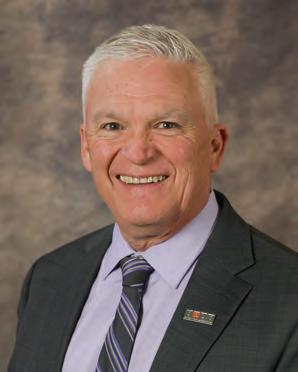
“SALC members represent the full political spectrum,” said Maxwell. “While we are nonpartisan, we deliberately engage a cross-partisan combination of individuals in our leadership teams from executive staff to board of directors. From our inception, we have maintained laser-focus on viewing issues through a business lens.”
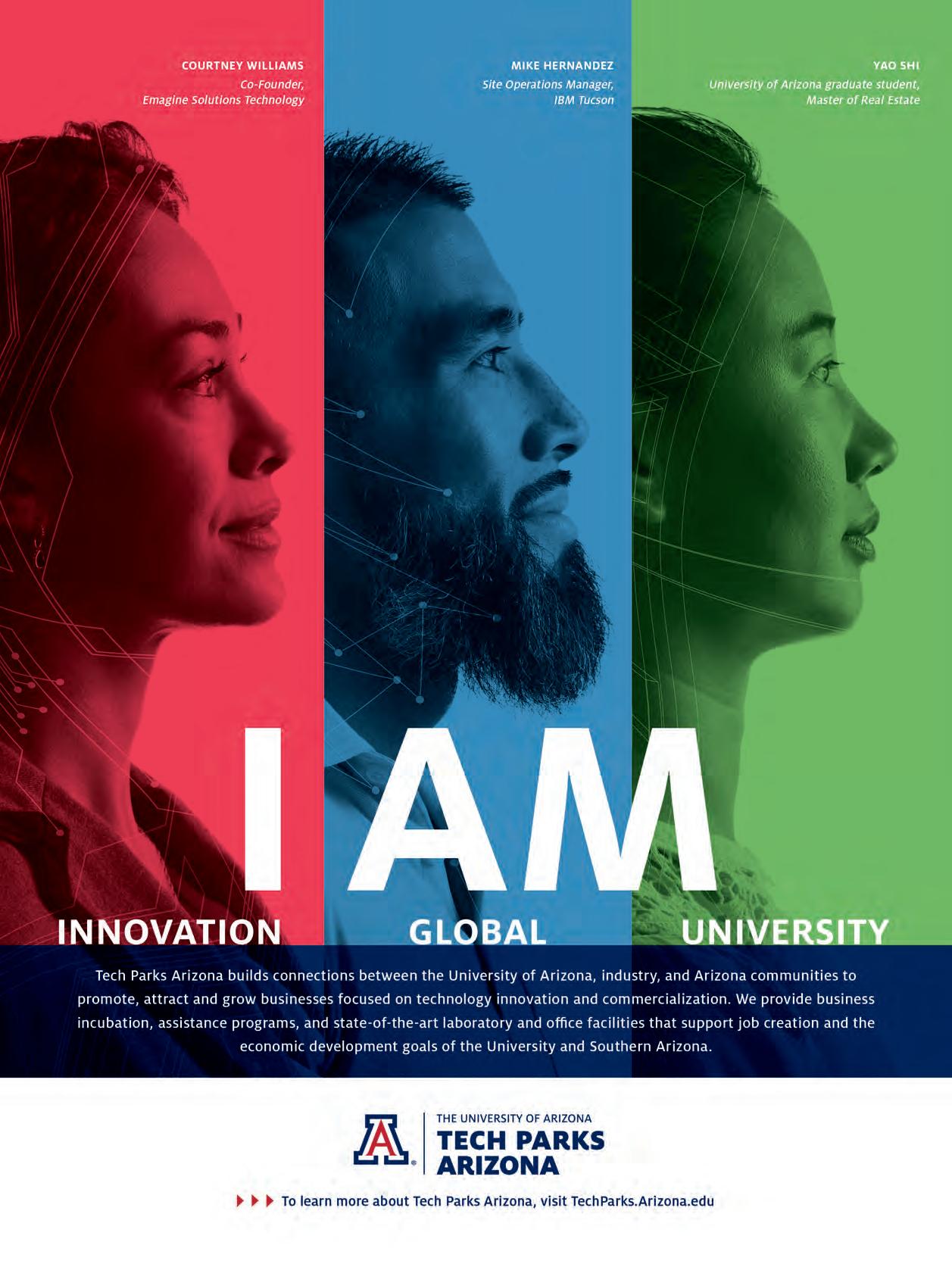
As Draper put it, “It really doesn’t matter much what my, or any other individual member’s, opinion is regarding what are the most critical issues facing the region. One of the organization’s core practices is to poll ALL of our members at least annually to identify critical issues of the day, prioritize them, and decide whether and how best to engage to advance them.”
Once membership consensus is achieved, that information is assembled into an annual Legislative Agenda and set of Policy Goals, which are then pursued through SALC’s five committees, called Focus Areas.
SALC has several items on its future priorities list, including voter-approved renewal of the Regional Transportation Authority, securing the region’s water future, and growing a skilled workforce, among others. By nature, these are complex issues that cannot be solved quickly; in fact, many will take years to fully address. But SALC is well-positioned to see these issues through to solution and has a 25-year history of doing so on important issues. Draper attributes this to SALC’s staying power, organized approach and the committed membership and staff.
Cohen added, “I could not be prouder of the impact made by SALC in its history and it was an honor to lead the organization as its chair over the past three years.”
“From our inception, we have maintained laser-focus on viewing issues through a business lens.”
– Edward P. “Ted” Maxwell President & CEO
Southern Arizona Leadership Council


Since its founding in 1997, SALC has grown from a membership of seven local business leaders to more than 140 members who represent an incredible diversity of thought, sectors and vision for Southern Arizona.

Over the past 25 years, SALC has become a respected and trusted voice on public policy through the lens of business at the local and state levels. This sterling reputation would not have been possible without the contributions of its members, each of whom is a distinguished leader in their own right.
Si Schorr was one of SALC’s seven founding members. A resident of Tucson since moving here in 1957, Schorr worked as an attorney in his ‘day job’ and devoted himself to numerous civic roles in his spare time, including service on the Governor’s Economic Planning and Development Advisory Board, Chair of the Tucson Pima County Commission on Improved Government Management, the City of Tucson Parks and Recreation Commission and the Tucson Airport Authority.
Schorr was instrumental in the formation of SALC and provided a significant voice for many years on its board of directors. “We grew slowly, but surely,” he said. “We understood as we
evolved that we needed broader, more diverse representation and that our mission needed to expand beyond immediate business issues. We realized that we needed an increasingly expansive view of community betterment.”
Now retired, Schorr remains very active at SALC as co-chair of its Governance Focus Area.

Melanie Rice joined SALC last year. Rice serves as VP of the Southern Arizona Division for Southwest Gas, an organization that has long contributed its voice and expertise to SALC. Rice joined Southwest Gas in 2008 and has held a variety of positions with increasing responsibility.
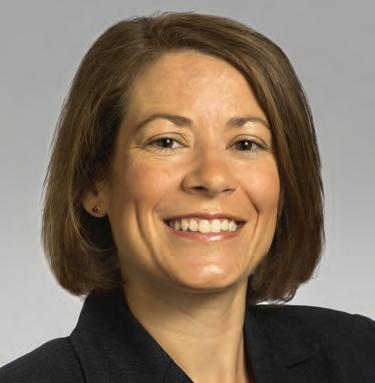
A resident of Tucson for the past 23 years, Rice is familiar with the issues affecting both the economy and quality of life in the region. She respects SALC and the work of the organization. “SALC’s biggest strength is the collaborative, bipartisan approach that it employs on all sectors and sizes of the region’s business community,” she said. “Seeking and leveraging different perspectives from across [SALC’s] organization results in better solutions.”
While Rice is new to SALC, Southwest Gas has long been an active supporter. Rice takes the SALC reins from
Southwest Gas’s Julie Williams, who served as SALC’s Board Chair before being promoted to Southwest Gas’s chief operating officer and relocating to the company’s headquarters in Las Vegas.
As she takes on this new role, Rice said she looks forward to working in the key areas of education and infrastructure.
“With my engineering background, I’m pretty passionate about quality infrastructure and energy systems that are appropriately sized for current needs, but flexible enough to accommodate future needs sustainably and efficiently,” she said. “We need creative solutions that foresee future challenges without an adverse economic impact to our communities.”
Rice looks forward to getting involved in the issues affecting the region. “SALC’s goals align well with our company’s, and I look forward to the opportunity,” she said.
Schorr added, “[SALC’s] goal is never to tell people what to do but to convene and partner with others working in the same venue. We believe that through cumulative effort and collaboration we can get things done.”
Knowing that a skilled and educated workforce is key to fostering a thriving economy, SALC has identified P-20 education as one of its main focus areas. The term ‘P-20’ refers to the continuum from preschool through university and into career pathways.
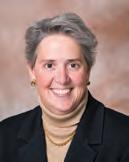


Co-Chair Steve Lynn said securing adequate public education funding remains a top priority. “As long as Arizona is languishing in 48th or 49th place in state per pupil funding, schools are unable to meet their full potential, and by extension, neither can their students,” he said. “In addition to this major issue, SALC is involved in supporting funding for community colleges and the state universities.”
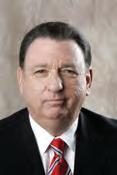
SALC has achieved some key successes in its support of public education. Co-Chair Donald Pitt said the creation of Tucson Values Teachers was a major milestone. TVT is a partnership of business leaders, educators and individuals with a shared mission to inspire and support teaching professionals in Southern Arizona. “Tucson Values Teachers now operates with an independent board as a subsidiary of SALC,” Pitt said. “Education with a quality teaching force is more likely to be successful and the actions of SALC to improve that important fact and take actions to improve compensation and working conditions for this very critical element of education is crucial.”


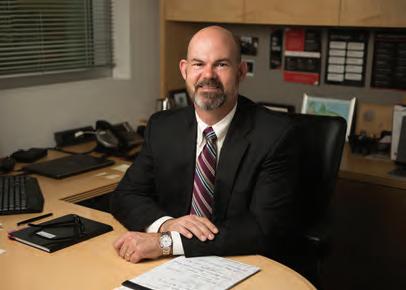
Quality infrastructure is critical to the long-term health of any community. SALC’s Infrastructure Focus Area has taken up this charge, with an eye toward effective water management and regional transportation issues.
Tom McGovern Principal Emeritus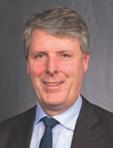
SALC has racked up several ‘wins’ in this area. It was a leading voice in creating the Regional Transportation Authority in 2004, an initiative that was ultimately approved by voters and focuses on improving roadways and creating more efficient transportation throughout Southern Arizona.

Within its first decade, SALC opposed harmful propositions that would have limited water access. In 1997, it led the campaign to ensure access to CAP water to support growth in the region and in 2007, helped defeat a proposition that would have curtailed water connections and new home construction. After this, SALC founded Tucson Regional Water Coalition (TRWC) to ensure a coordinated response to issues of water resources and sound management of water resources within the region. SALC member Kip Volpe co-chairs the TRWC.
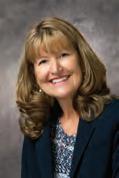 Co-Chair Greg Taylor Regional Vice President Community Affairs Az Complete Health Co-Chair Chad Whelan President Whelan Consulting
Co-Chair Greg Taylor Regional Vice President Community Affairs Az Complete Health Co-Chair Chad Whelan President Whelan Consulting
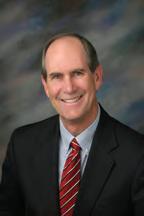
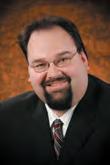

Access to quality healthcare is a crucial element in fostering a community’s high quality of life. SALC created the Healthcare Focus Area to champion a sustainable, high-quality healthcare system in the region and to foster growth in the regional healthcare industry.

Nancy Johnson, retired CEO of El Rio Health and co-chair of the Healthcare Focus Area, said healthcare is part of a ‘three-legged stool’ affecting the region’s quality of life and long-term economic outlook. “[We need] strong economic development, great educational systems and strong comprehensive healthcare systems,” she said. “Preventative community-based care
improves access to care, less chronic disease----resulting in the ability to be strong employees, complete and continue education and contribute to the community’s well-being.”
Johnson, along with co-chairs Greg Taylor and Chad Whelan, view their mandates as communication, advocacy and collaboration. She added, “As cochairs of the Healthcare Focus Area, our mandates are to keep business leaders educated on emerging healthcare trends, advocate for policies to improve healthcare and/or prevent harmful policies, and lastly, collaborate with key partners on healthcare programs and initiatives.”

Co-Chair Mara Aspinall Managing Director BlueStone Venture Partners
Co-Chair Anthony Cook General Manager AHS Center of Excellence Komatsu
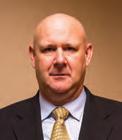
Co-Chair Calline Sanchez VP, Arizona & New Mexico IBM

To understand the work of the Innovation Economy Focus Area, it helps to understand exactly what’s meant by that term. SALC defines it as an economy that pursues the development of hightech, high-wage jobs for the region and one that supports efforts in research, tech transfer and venture capital. Simply put, an innovation economy is one that fosters a strong entrepreneurial culture.
“We recognize our region’s strong skills in technology and science,” said co-chair Mara Aspinall. “We call Southern Arizona the ‘Silicon Desert’ due to the extraordinary inventions, technolo-

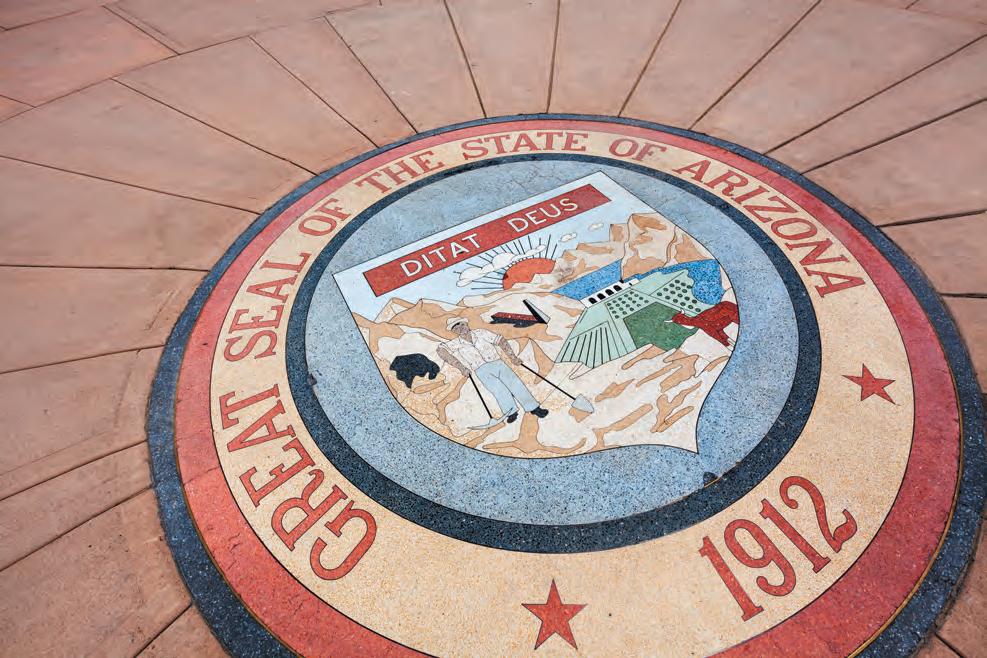
gy and intellectual property coming out of our region. This is generated by our innovative companies, large and small. We are best in class leaders in software and data storage with IBM and others, in life sciences with Roche and others, as well as in aviation, mining, and imaging.“
This group identifies its ‘big rocks,’ or main priorities, as retaining early talent in Tucson, retaining and growing businesses who have chosen to locate in Tucson, and fostering diverse, on-going forums to discuss the best ways to foster an entrepreneurial spirit and support local business.

Ted Hinderaker Partner
Hinderaker, Rauh & Weisman
Co-Chair Sarah Smallhouse President

Thomas R. Brown Foundation

Co-Chair Si Schorr Partner (Ret.) Lewis Roca
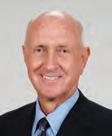

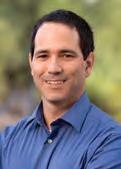

The purview of the SALC Governance Focus Area is to make data driven recommendations regarding how to improve local, regional, and state governance structures and then address deficiencies. Co-chair Ted Hinderaker said, SALC is a politically diverse organization, with members who are very conservative, very liberal, and everything in between. SALC does not have a partisan agenda but rather seeks to identify policies and win-win positions that are good for the entire region. Decisions are reached by consensus and we seek
to identify and implement good governance policies using a data driven approach.”

This Focus Area has had several notable successes. It led Prop 403 and 404 campaign to change the City of Tucson charter to give the Mayor voting parity on City Council as well as to give the City Manager sole ability to hire/fire direct reports. It also is a strong voice in support of making the requirements to vote and run for office uniform for all political parties.
Co-Chair Warren Rustand CEO Tycon, Inc.
SALC’s Public Policy committee monitors emerging issues influencing the economic viability and quality of life in Southern Arizona as well as the state of Arizona. This committee makes recommendations for action on pending legislation and initiatives, particularly on those issues that are not covered under one of the five Focus Areas.


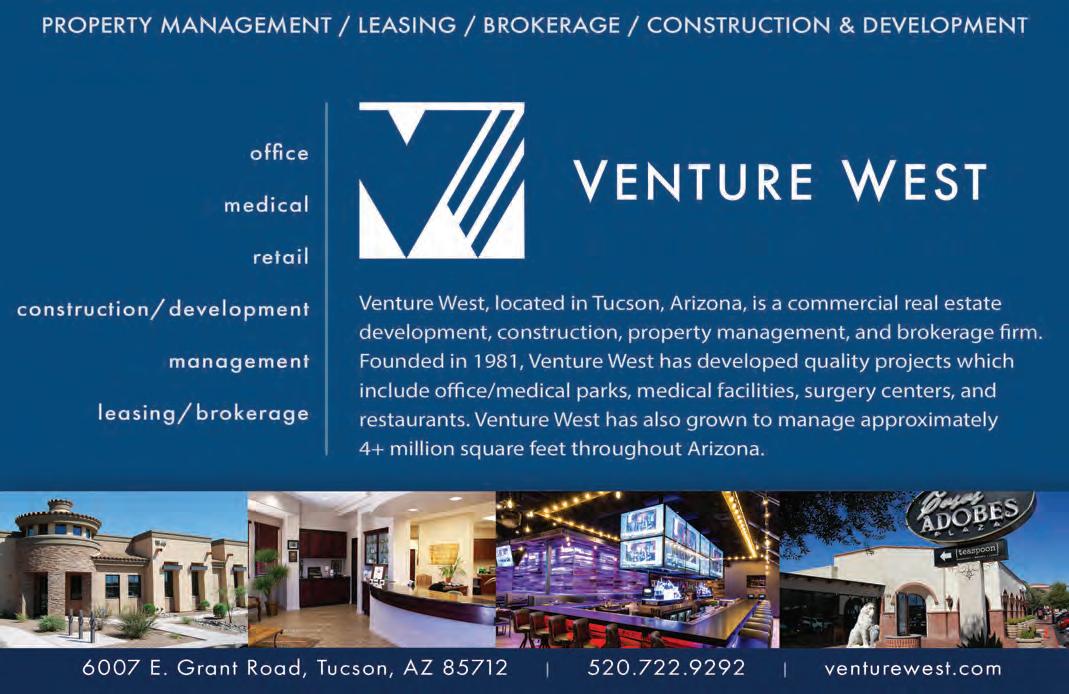


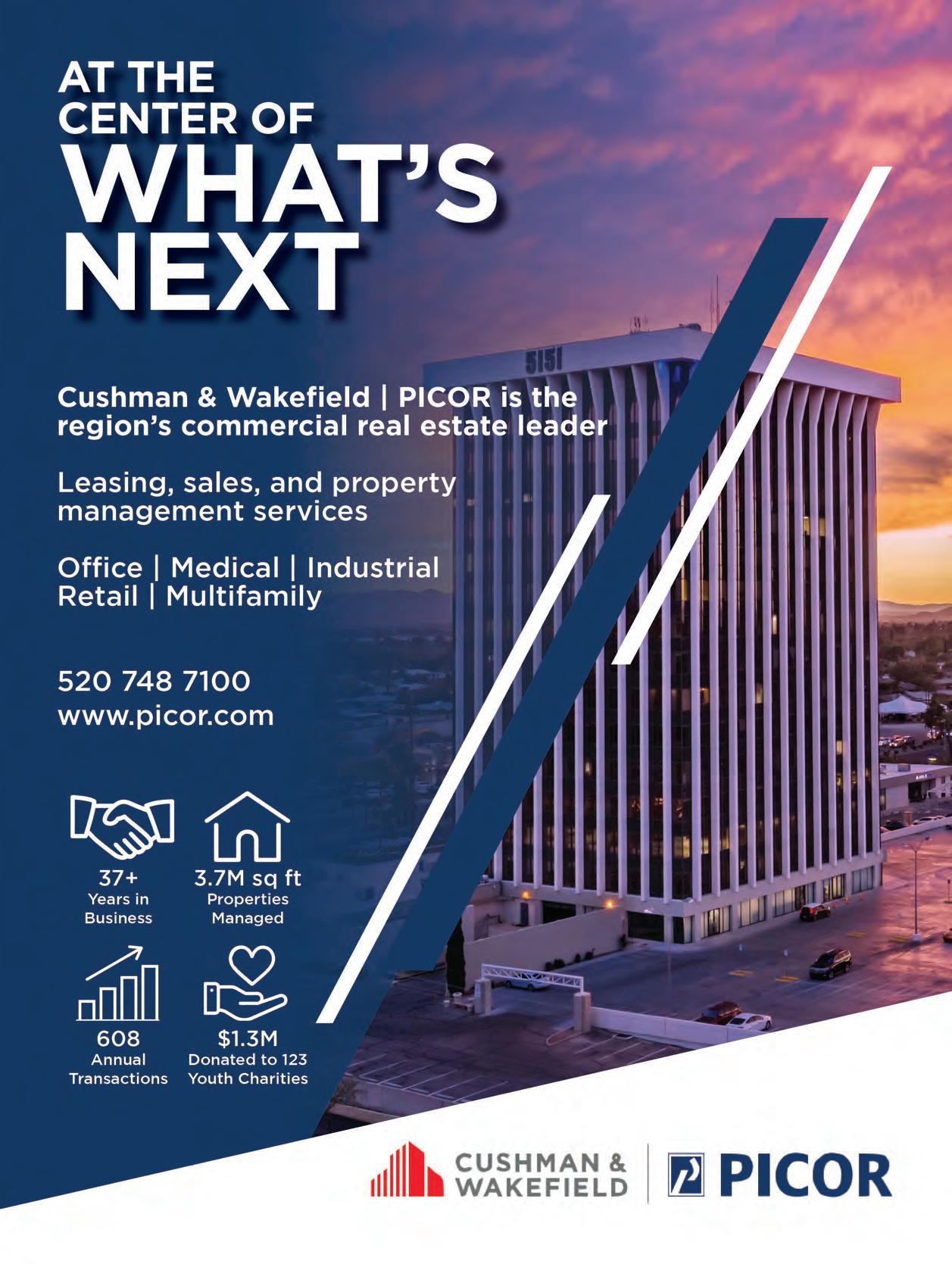

 Andy Heinemann CEO
Andy Heinemann CEO
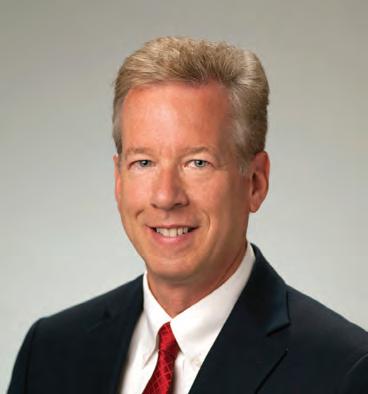 Yentzer Executive Director
Yentzer Executive Director

The founding of Tucson Values Teachers and Tucson Young Professionals and a strong partnership with FlinnBrown Civic Leadership Academy represents Southern Arizona Leadership Council’s commitment to enhancing the region’s economic climate and quality of life.
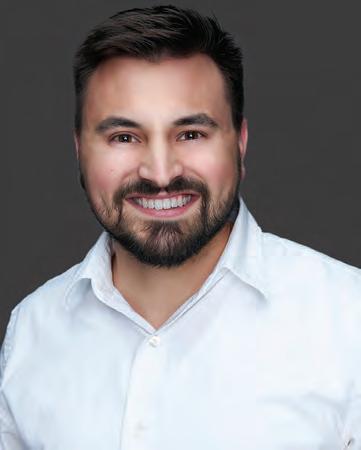
Recognizing the importance of highquality teachers for the success of our region, SALC set about to create an organization that would celebrate outstanding teachers and elevate the pro-
fession. The result was the founding of TVT in 2008 into its own 501(c) (3) organization, with office space and support provided by SALC, and member Jim Click was a key early funder of TVT.
“SALC’s members appreciate the direct connection between the strength of our education system and a high-quality workforce,” said Shelley Watson, VP and COO of SALC, and board member for TVT. “Teachers are at the heart of the education system and the No. 1
predictor of student success is a qualified teacher at the front of the class.”
TVT has become an important platform for recognizing and rewarding great educators. The group’s signature annual event, Stand Up 4 Teachers, brings together business and community leaders to honor the best and brightest educators from preschool through high school.
With the 2006 founding of Tucson Young Professionals, SALC demon-
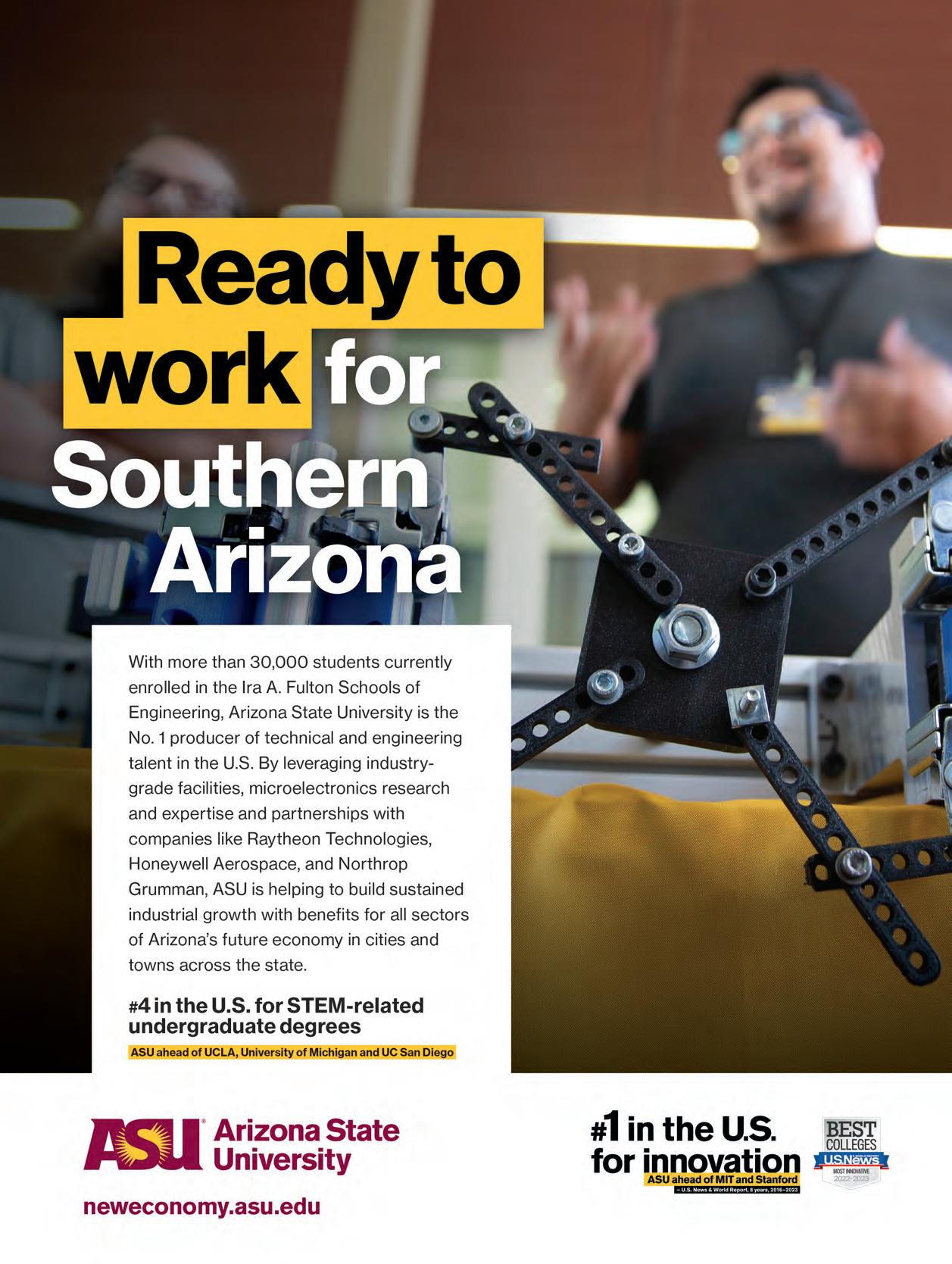
strated its desire to help shape the next generation of community leaders in Southern Arizona.

“Our members desired to create an organization that would encourage young and mid-career professionals to retain them in the region and assist in their development into community leaders,” Watson said. TYP was born and formed its own nonprofit organization. It has grown rapidly over the past few years, now with close to 1,000 members, and has forged creative partnerships with large employers in the region who sponsor TYP memberships for their employees interested in joining.
In order to ensure connectivity between the two organizations, SALC’s board voted to create a permanent seat on its board for whomever is presiding as the TYP board president. Additionally, SALC’s Director of Governance and Outreach, Nicole Barraza, serves on TYP’s board.
One of the highlights of the SALCTYP partnership is a guided mentor-
ship program in which SALC members are paired with TYP members for a 12week program consisting of 30-minute weekly conversations around personal and career goals. SALC mentors share their expertise and advice, and TYP mentees provide valuable “reverse mentoring” that helps SALC’s business leaders better understand the perspectives of their younger employees.
Shelley Watson added, “It has been amazing to witness what can happen in just 12 weeks. Truly life-changing results have occurred for mentees during this program – things like job promotions, successful handling of difficult professional situations, and formation of personal goals. We are grateful to SALC’s members who invest their valuable time to give back to young professionals.”
SALC has partnered with the FlinnBrown Civic Leadership Academy since its inception. The Flinn-Brown Fellowship is the flagship program of the Arizona Center for Civic Leadership at the Flinn Foundation and helps emerging and experienced civic leaders
from throughout Arizona expand their knowledge, skills, and networks to help address Arizona’s long-term issues.
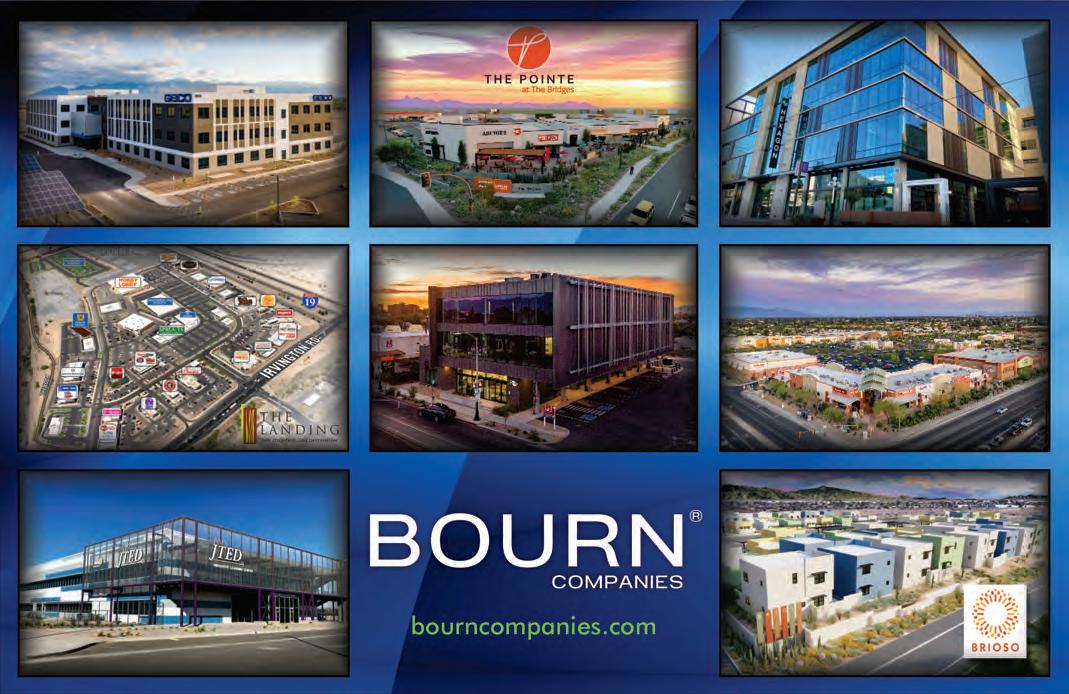
SALC extends a special invitation to Southern Arizona Flinn-Brown Fellows who have completed the program to join SALC as an associate member for one year. This practice was established in 2011 with the first Southern Arizona cohort to increase the fellows’ understanding of the role business and government play in building a strong economy for our state.
“Flinn-Brown fellows are our state’s most exemplary civic leaders,” said Dawn Wallace, VP of Arizona Center for Civic Leadership, Flinn Foundation. “By offering fellows a seat at the table with senior business leaders and actively engaging them in public policy decisions, SALC shows its commitment to further cultivating their civic leadership and utilizing their incredible talent and expertise to solve our state’s most challenging issues.”
















